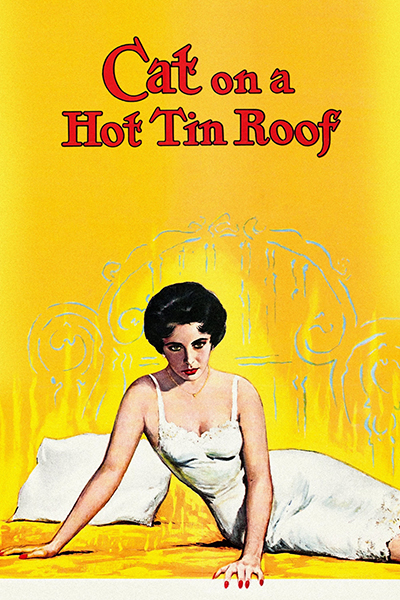Cat on a Hot Tin Roof (1958)
By Hervé St-Louis
June 11, 2022 - 06:56
Studios: Avon Productions (II), Warner Home Video
Writer(s): Richard Brooks, James Poe; Tennessee Williams
Starring: Elizabeth Taylor, Paul Newman, Burl Ives, Jack Carson, Judith Anderson, Madeleine Sherwood, Larry Gates, Vaughn Taylor
Directed by: Richard Brooks
Produced by: Lawrence Weingarten
Running Time: 108 minutes
Release Date: 23 August 1958
Rating: PG (Parental Guidance Suggested)
Distributors: Metro-Goldwyn-Mayer (MGM),
 |
While the film may look like just another contrived story about inheritance and backroom plays by Gooper, Mae, and Maggie for Big Daddy’s estates, this is just one aspect of the film. The story is clearly about the grief Brick feels for the death of his best friend and dare I say lover which was caused by his wife in a fit of jealousy over the two men’s relationship. Many critics have been annoyed over the years by the censoring of the direct theme of homosexuality in this film due to mores of the time. However, when I first saw this film, and again today, the theme is as clear and perceptible.
Brick, forcefully played by Paul Newman was a golden child, seemingly perfect in every way and his parents’ favourite. He took a wife, and all was well until he had to pick between her and Skipper. Maggie forced the choice, causing Skipper’s death by suicide, and thus Brick started to resent his wife more than ever. Maggie, beautifully played by sultry Elizabeth Taylor is a beauty that no red-blooded man should resist, unless he is gay, and love stricken over another man. The characters Newman and Taylor played helped redefine their careers and land them better dramatic roles, thereafter.
Big Daddy’s secret cancer, hidden from him and Big Mama overtakes the centre stage in this dysfunctional family dynamic and forces Brick to act before he loses his father for good. The film’s ending is far more positive for Maggie and Brick than author Tennessee Williams wanted. Regardless, the film became a success thanks in part to Burl Ives’ Big Daddy who demonstrated both on the stage and on camera why he was the patriarch of the family.
Contemporary viewers may cringe at the clinginess and secondary positions of women in this family. Most are referred as “woman” instead of by their names by Big Daddy which, I admit, made me chuckle every time. But this is how the family dynamics was then and that’s one of the reason this film is so great. The actors give their best in what is essentially, a talking head movie where they try to fiddle with props in their environment to pass the time as they deliver curt and revealing lines that probably made people of the time think about issues of marital fidelity, death, inheritance, and of course homosexuality.
The one criticism I have for this incredible performance is that the Blu-Ray extras were short for such and important film.
Rating: 9.5/10
Related Articles:
Exit Stage Left Snagglepuss Chronicles #4
The Snagglepuss Chronicles #1
